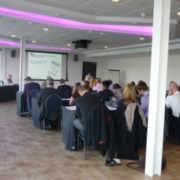Moving towards a self-sustaining future
I arrived at the seminar with some time to spare. For those who don’t know Bristol well, M Shed is a great venue. It’s a museum situated right on the harbour side, with a fantastic view over the city from floor-to-ceiling windows. I admired the view – not for the first time – whilst anticipating the beginning of my first APSE event.
Though I could easily write all about the fascinating and innovative ideas that emerged from each of these speakers’ presentations, I’ll limit myself to talking about five of the speakers. For anybody who wants to read more, all the presentations from this seminar are available on the APSE website, under the Previous Seminars page.
After a warm welcome from APSE’s Chief Executive Paul O’Brien, Mike Wiltshire from the Department of Business Innovation and Skills (BIS) was first to take the floor. Mike pointed out that the whole devolution process was very un-Whitehall and there was therefore no real precedent. He stressed that devolution negotiations should be seen as an ongoing dialogue which local authorities must take the initiative in driving. He stressed that an initial “no” may not mean that there will not be room for negotiation in future, and if councils are passionate about their ideas they need to be prepared to bring these ideas back to the table time and again. Authorities proposing more challenging governance reform (including mayoral models) with clear propositions and developed business cases have had more success in negotiating successfully.
Coming from a scrutiny background myself, I was looking forward to hearing from Jacqui McKinlay, Executive Director from the Centre for Public Scrutiny (CfPS). Jacqui said that scrutiny arrangements were intrinsic to the devolution deals being agreed, so it seems very clear that scrutiny is here to stay. However, the CfPS did have serious concerns about the lack of transparency of the process which, it was suggested, could set the tone for how devolution would work in future. Another issue discussed was how decision-making below Mayoral level will be carried out. This showed that the importance, therefore, placed upon local areas to develop their own robust governance and accountability frameworks could not be clearer.
After a very enjoyable lunch, with opportunities to network, Michael Lockwood from the London Borough of Harrow spoke about commercialism as a method for transformation and change.
Michael set the scene for his presentation by underlining how reduced levels of funding have left many councils requiring more efficiency than ever before. However, he believes that they have now been “re-structured to death” and that, ultimately, the next three to four years of funding cuts will be very challenging.
One of the key messages from Michael’s presentation was that councils need to be self-aware and, as such, sell the services they excel at, whilst buying in the ones they are more likely to struggle with. Interestingly, he encouraged councils to ‘win our share of the market from the private sector’. He suggested that a cultural change is desperately needed within local authorities, and a space should be opened up where new ideas are encouraged and innovation is celebrated. A very noteworthy example was Harrow’s ‘Project Phoenix’ that has resulted in a cost-neutral grounds maintenance service. Whilst setting up this project, they completely restructured their staff and services, and realised that they had excellent members of staff with skills that weren’t being fully utilised. Fully utilising their staff, they have now expanded some environmental services, enabling them to provide a substantial annual income for the council.
Our next speaker was Mark Bradbury from Southampton City Council, who provided a thought provoking presentation about generating income by means of property assets. Mark’s advice to other authorities was to do this whilst we still have the financial resources. He said a property investment strategy is a good idea though it is vital this is backed with political will, and he stressed that it was important to differentiate whether it was for income or regeneration purposes; it is essential to have separate strategies for each one. According to Mark, a trading company isn’t always required, however if, for instance, you were building properties to rent out privately, it would make sense to have a separate company to protect the rest of your business from investors.
The final speaker of the day was Andy Mudd, Head of APSE Solutions. He gave a thought-provoking presentation about Trading, Charging and Income Generation, highlighting recent research showing 40% of councils are now undertaking more than £1 million worth of trading each year, which shows how important it has become that councils look to achieve self-sufficiency. Trading, it would seem, has now become a must for local authorities to close the funding gap. Although it was pointed out that trading alone will not be enough.
Andy recommended that we first identify what we’re best at and where we want to focus, then checking that we have the correct powers to trade. He also pointed out that it was important to look at key strategic issues, such as any synergies or conflicts with existing corporate objectives, resource availability, and market position.
I found attending this seminar to be highly beneficial. The programme covered some of the most pressing issues and difficult decisions that local authorities are currently contending with. In fact, I left the event relatively upbeat, armed with a range of ideas and newfound knowledge that I could take back to discuss with my colleagues. Overall, the seminar has left me optimistic that we can help move our councils towards a more self-sustaining, brighter future.


.png)



.png)